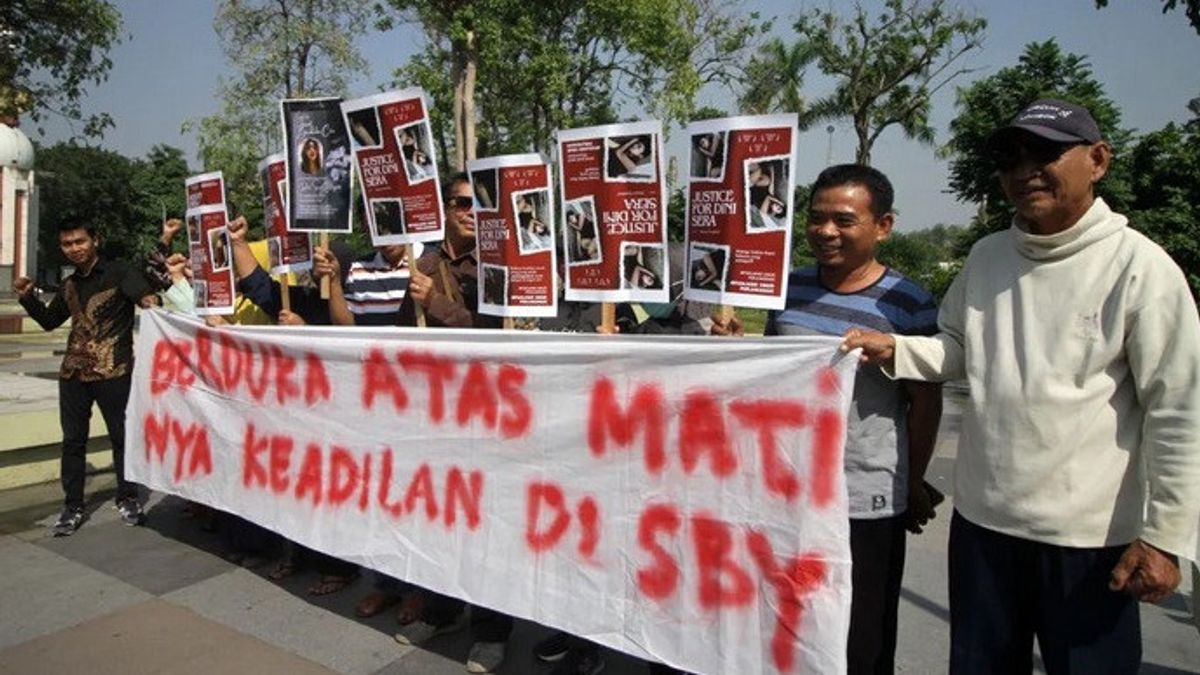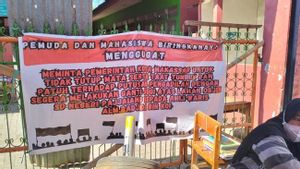JAKARTA The free verdict against Gregorius Ronald Tannur not only tarnished the image of the law in Indonesia, but also became an alarm that violence against women is still underestimated.
The Dini family of Sera Afrianti was shocked when she heard the news that Ronald Tannur was acquitted by the panel of judges at the Surabaya District Court from criminal charges in the alleged murder case.
The judge's decision to release Ronald Tannur not only reopened the wounds of the deceased's family, but also the general public who are still disappointed with law enforcement in Indonesia.
"The prosecutor's professionalism is questioned by the public, the active role of Mahkahmah Agung (MA) and the judicial commission is mandatory, should not be repeated and there needs to be an immediate correction," said criminal law expert Masykur Isnan when contacted by VOI.
Not only that, the decision of the panel of judges at the Surabaya District Court who acquitted Ronald Tannur was considered an alarm of the danger of handling cases of violence against women by law enforcers. This also adds to the blunt track record of justice in women victims of violence.
One of the judge's considerations was that Ronald Tannur was not proven to have run over Dini Sera with his car. The panel of judges at the Surabaya District Court stated that Dini Sera's death was caused by another disease due to drinking alcoholic beverages, not because of injuries by the defendant Ronald Tannur.
"Dini's death was not due to internal injury to his heart, but because there was another disease caused by drinking alcoholic beverages during karaoke, causing Dini's death," said Chief judge Erintuah Damanik in a verdict hearing read Wednesday, July 24, 2024.
In addition, according to the judge, Ronald Tannur was still trying to help the victim during his critical period. The evidence is that the defendant still had time to take the victim to the hospital for help.
"The trial has considered carefully and found no convincing evidence that the defendant is guilty as charged," said the judge.
The panel of judges also concluded that no witness knew for sure Ronald had committed a crime as the prosecutor's indictment. In addition, the judge saw no evidence that Ronald ran over the car he was driving.
In fact, the contents of the CCTV footage show the Innova car driving when a woman (Dini) sits leaning on the left door. A man (Ronald) got into the car and drove the vehicle so that the woman was dragged and run over. Ronald concluded that he had no intention of killing or seizing the lives of others so that the elements in the indictment were not fulfilled.
Criminal law observer Masykur Isnan said the judge's consideration of seeing evidence must be comprehensive, not as currently reported, namely in the statement of one expert and the narrative that the defendant had good intentions by taking the victim to the hospital, without considering the suitability of all evidence to make conclusions and beliefs in making decisions.
The verdict is also considered not to reflect aspects of justice and benefit, causing shocks and problems.
"Interestingly, looking at the dynamics at trial, judges tend to be formalistic in law, this is a separate note if it is juxtaposed on a sense of public justice that should not be ruled out," said Isnan.
"The judge and law should not only be the mouthpiece of the law, but must be more progressive in the values of justice and benefit," he added.
In the midst of public concerns about the law in Indonesia, according to Masykur Isnan, this case only adds to anxiety. He said the law was no longer considered effective in controlling and making trust in law enforcement and law enforcement disappear.
To respond to the public's response, which was already angry with Ronald's acquittal, he said that the appeal by the high prosecutor's office could be the right step so that justice could be upheld.
"Because of this case, the image of the law, legal institutions, and legal apparatus is again at stake," he concluded.
The panel of judges at the Surabaya District Court not only disappointed the families of the victims, but also the people who were waiting for justice in cases of violence against women in particular.
The panel of judges' claim that Dini died of drinking alcohol culminated in the disappointment of Komnas Perempuan over the acquittal against Ronald Tannur. Komnas Perempuan Commissioner Siti Aminah Tardi emphasized that the Dini murder case could be called a femisida act.
"Including the category of femicicides in intimate relations or investment partners that have not been properly recognized in Indonesia," said Siti.
Komnas Perempuan provides a formulation of the notion of femicuda as a murder that is intentionally committed against women because of gender or gender, which is driven by superior feelings, dominance, or misogini towards women, feelings of belonging to women, inequality of power, and sadistic satisfaction.
Residents rallied over the trial of the Surabaya District Court (PN) judge's decision which released Gregorius Ronald Tannur in Sidoarjo Square, East Java, Monday (29/7/2024). (ANTARA/Umarul Faruq/aww)
Cases of murder against women must be a concern. The reason is, this happens very often in the midst of society.
Siti Aminah added that the murder case against Dini was an escalation of the dating violence experienced by the victim during the construction of a relationship with Ronald. The acquittal against Ronald made the victim's right to justice not fulfilled.
"This gives a message to the public that violence against a boyfriend is not punished, especially if the suspect has power of attorney," said Siti.
According to Komnas Perempuan data in 2023, intimate femicicides are at the top of the case with the highest news. There were 64 cases of femicicides involving violence against wives (KTI), 33 cases of dating violence (KDP), 11 cases of ex-girlfriend violence (KMP), and one case of ex-husband (kms) violence.
Meanwhile, the social sector of The Indonesian Institute (TII) Dewi Rahmawati Nur Aulia explained that the cases of femicine or female murder were regulated by Article 44 of the Law on the Elimination of Domestic Violence (UU KDRT) and the Criminal Code Law Article 338, Article 339, Article 340, Article 344, Article 345, and Article 350. He regretted that the judge did not see the case of Early Murder as a crime.
Gregorius Ronald Tannur's acquittal decided by the panel of judges at the Surabaya District Court is not only an alarm of the danger of handling cases of violence against women, but also adds to his blunt track record of justice in women victims of violence.
"Violence perpetrators have only been sentenced to a low sentence," said Dewi.
SEE ALSO:
The patriarchal culture that is still adhered to by some Indonesians makes women vulnerable to violence. Dewi hopes that law enforcers have high sensitivity to gender perspectives in handling cases.
It is necessary to compete in handling cases. This can be done by holding a number of training or workshops for handling cases of women with human rights and gender perspectives, Dewi ending it.
The English, Chinese, Japanese, Arabic, and French versions are automatically generated by the AI. So there may still be inaccuracies in translating, please always see Indonesian as our main language. (system supported by DigitalSiber.id)














